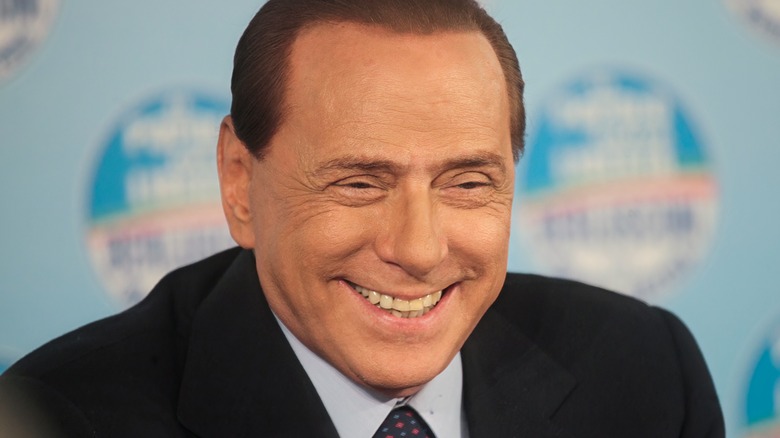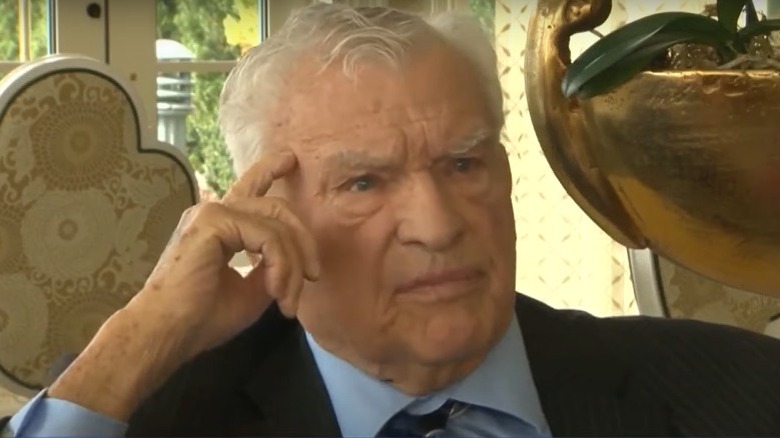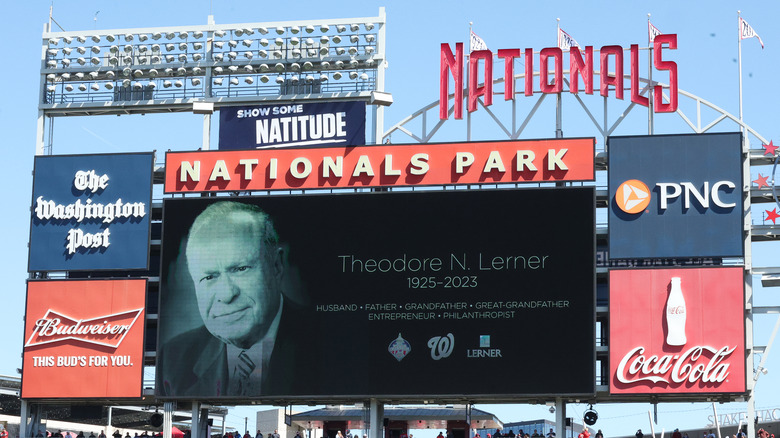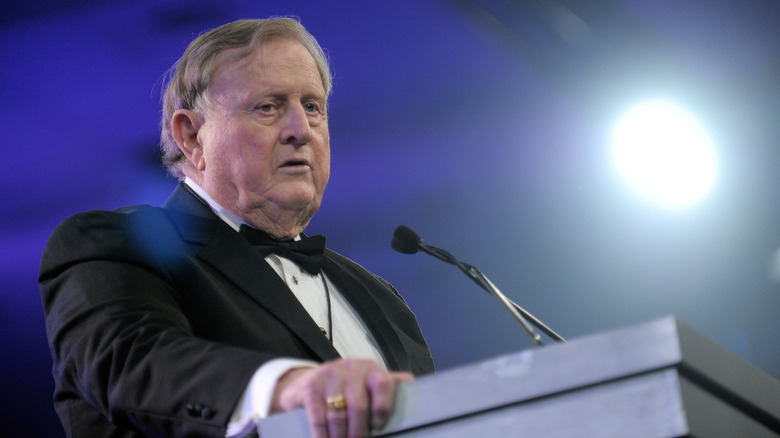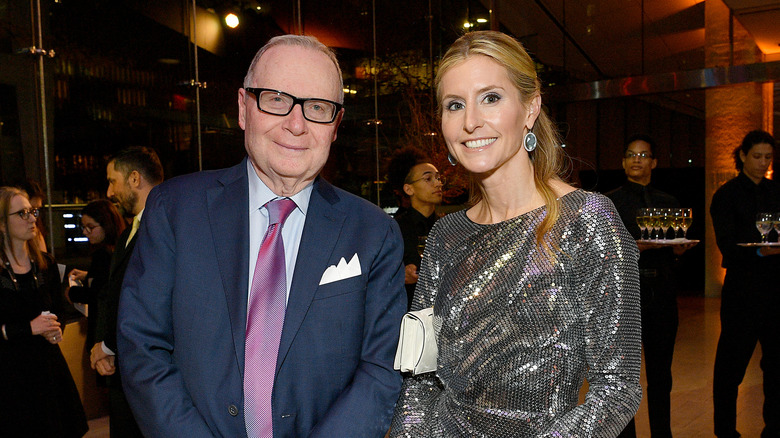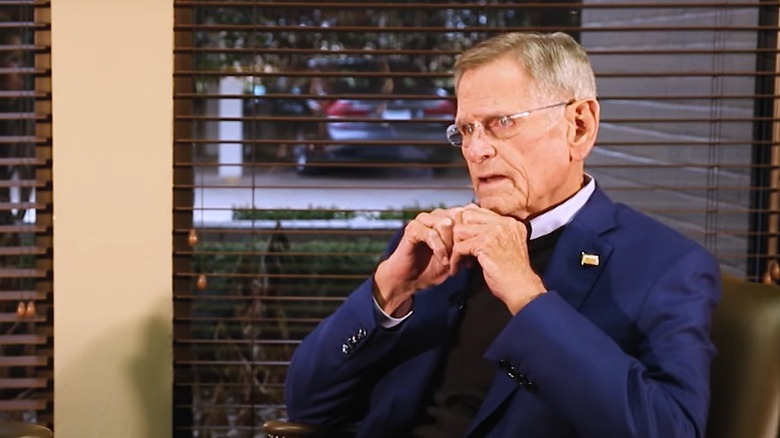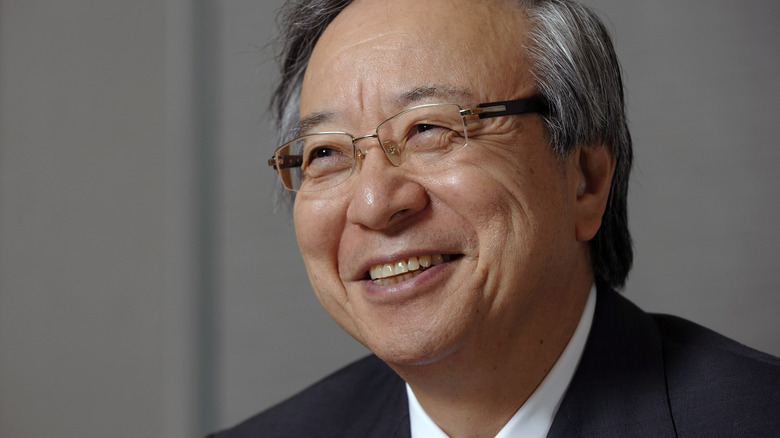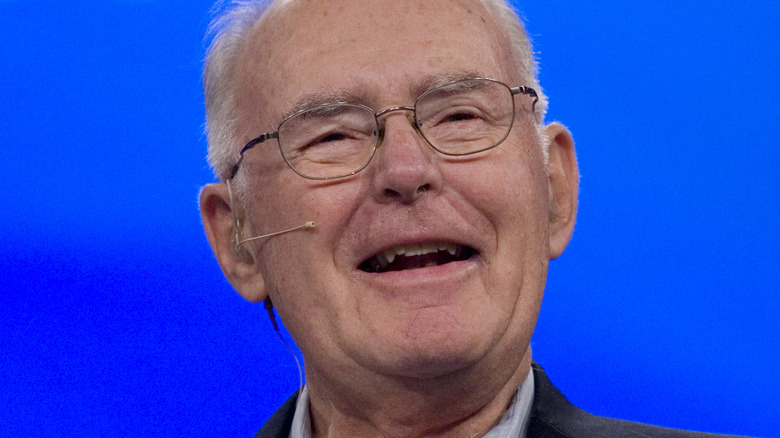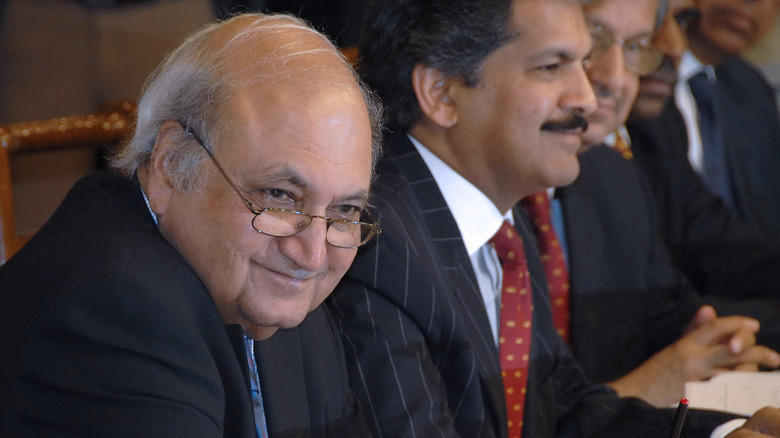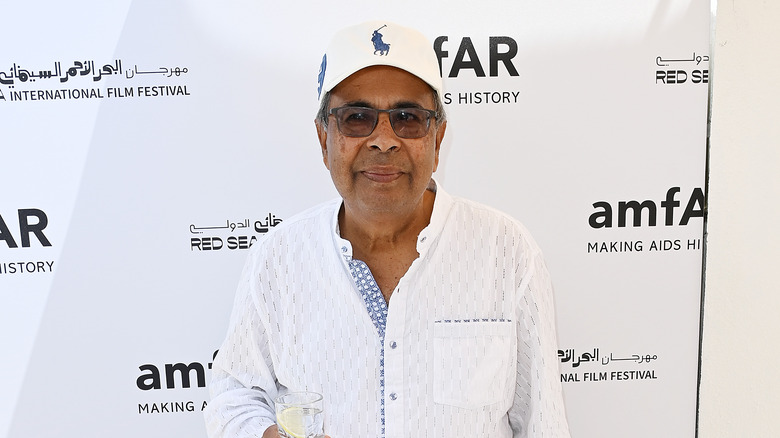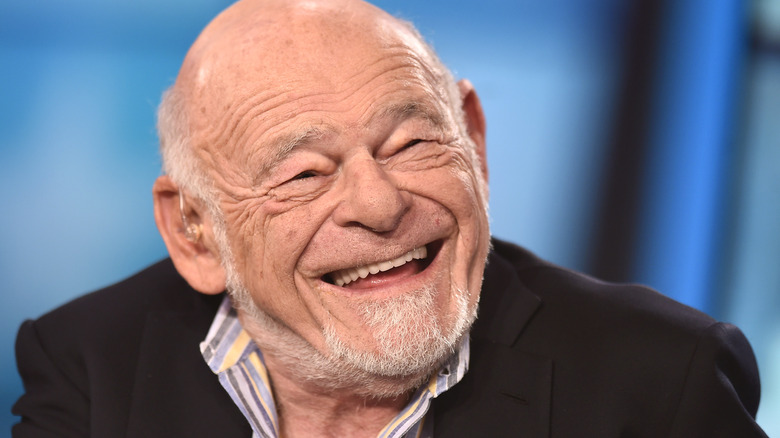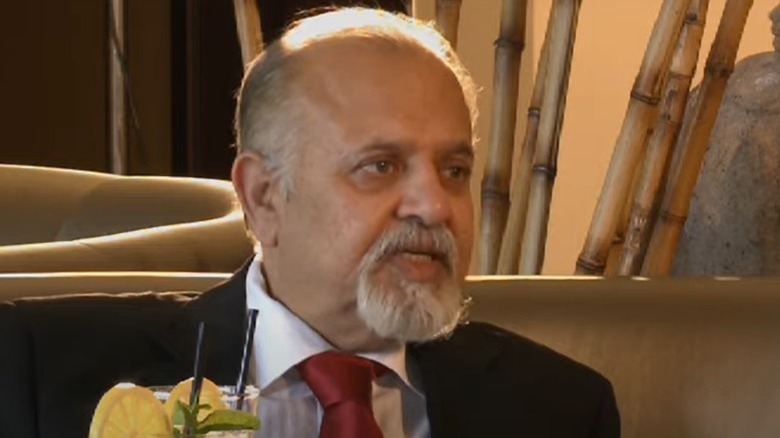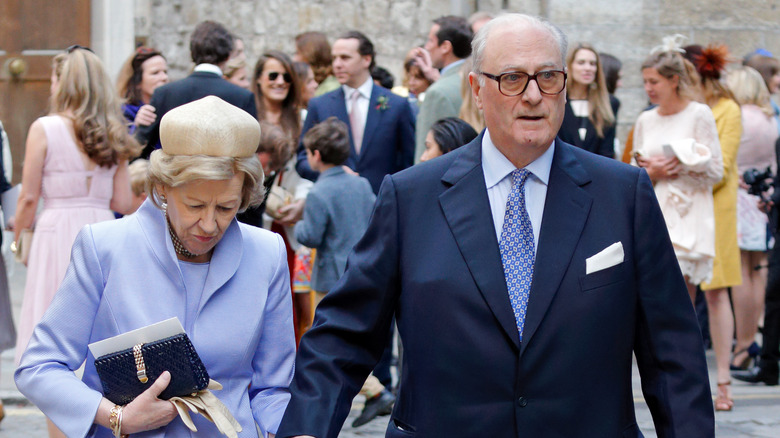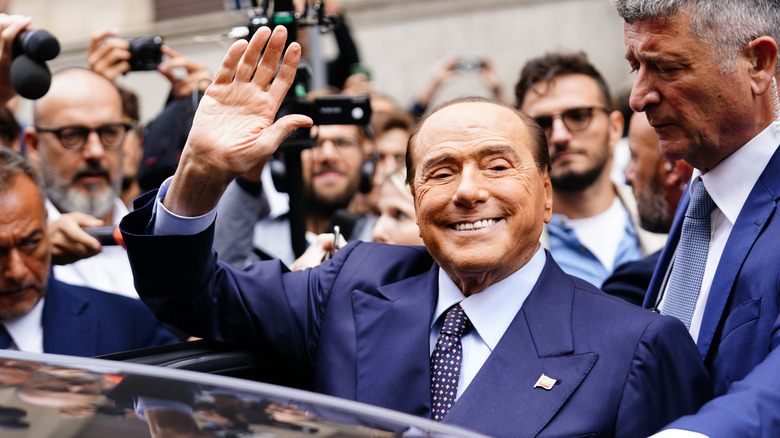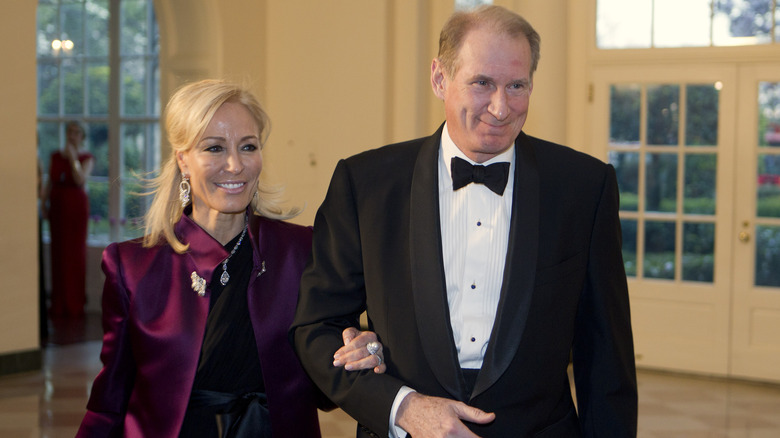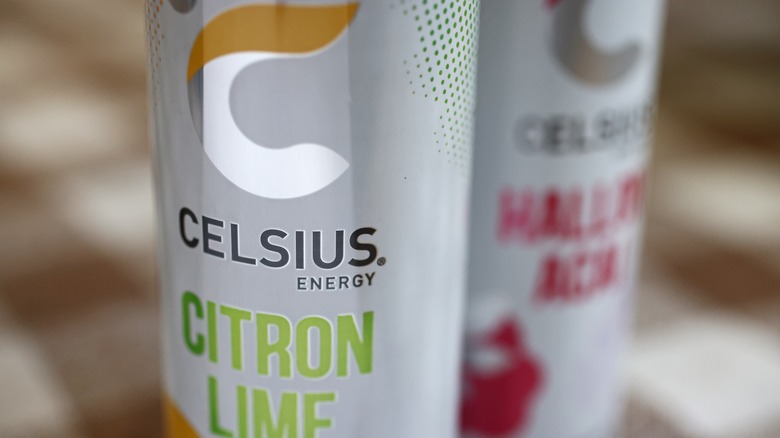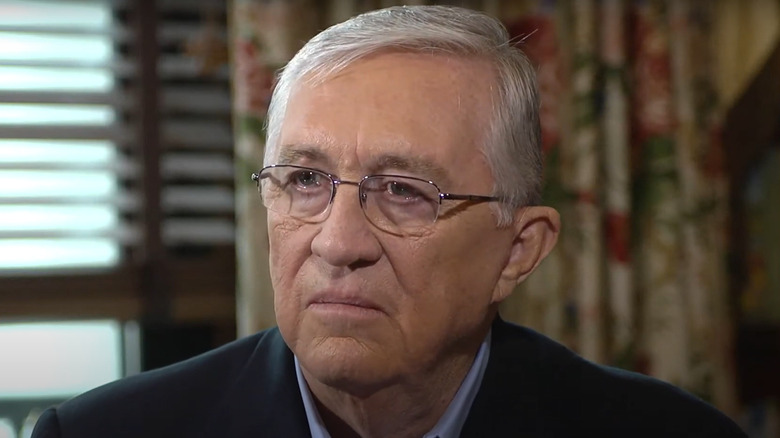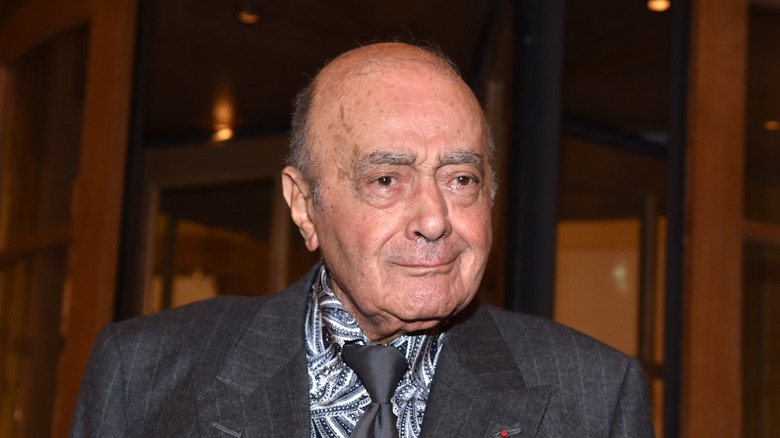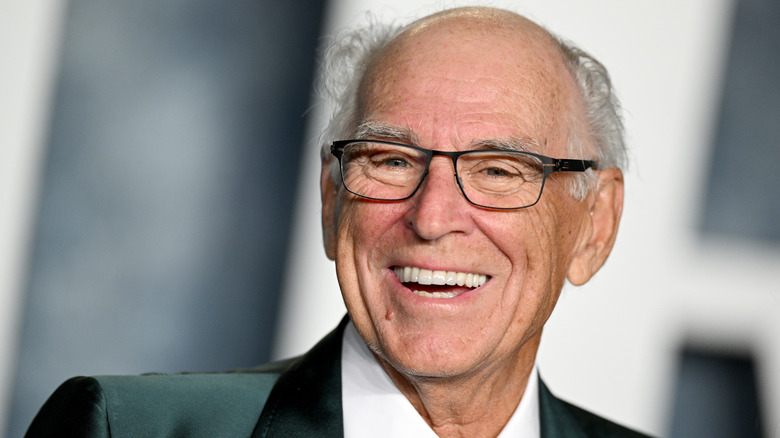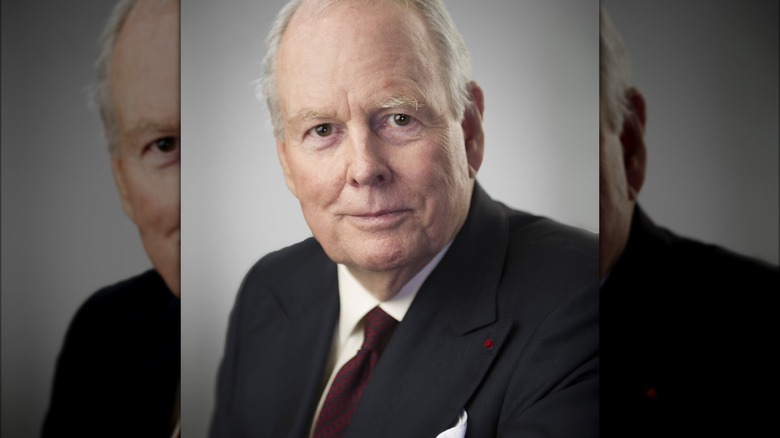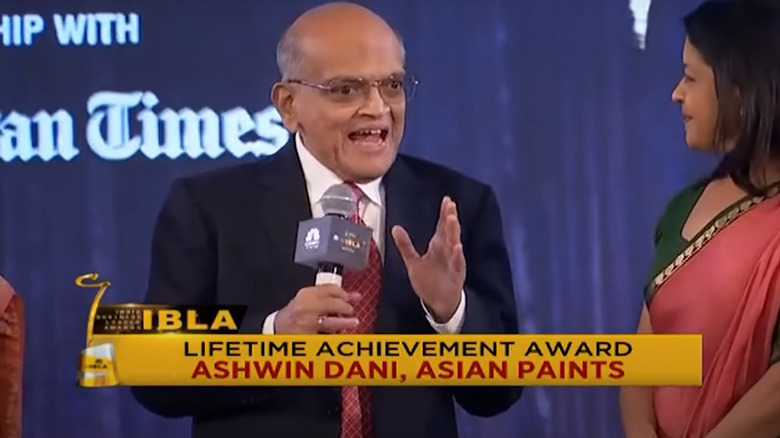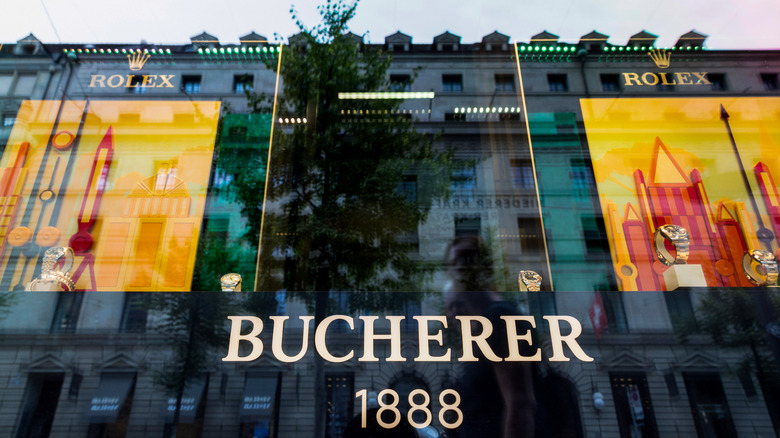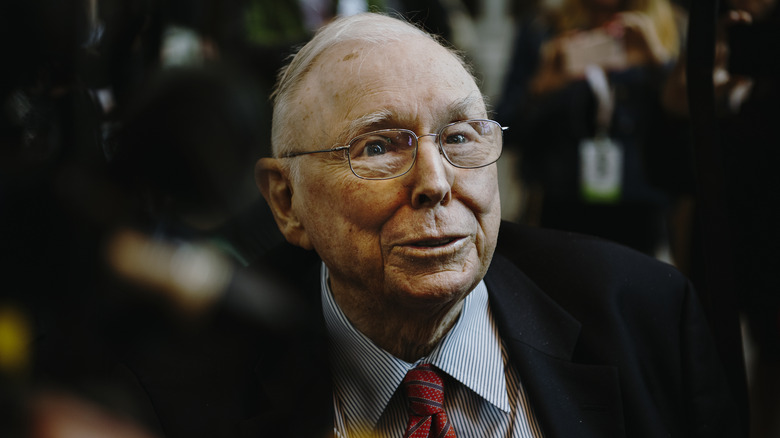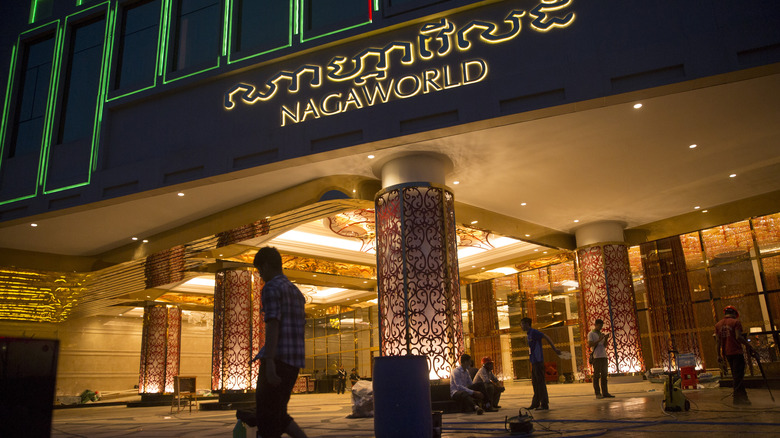Billionaires Who Died In 2023
No matter how much money you accumulate in life, one day you will die just like everyone else. And 2023 saw some of the richest people on Earth take their last breaths. However, if you only go by what gets reported online, you'd think a lot more billionaires died than the actual number. That's because it makes a lot better headline to say a billionaire died than just some very, very rich guy.
Take Hamish Harding, one of the five victims of the Titan submarine implosion. Virtually every article about his death calls him a billionaire, but if you look just a little bit deeper, it's impossible to figure out why anyone thinks he had that much money. He was rich, sure, but Forbes, which keeps a real-time list of every billionaire on the planet, wrote that his actual amount of wealth is unknown. And despite being referred to as a "billionaire" by some British outlets, Forbes essentially doesn't recognize him as such. In other cases, like Roberto Ongpin and Mario Lopez Estrada, they were definitely billionaires at one point but their net worth had dipped below the magic number by the time they died. And some, like Russian oligarch Sergey Grishin, had such shady finances that while it's very likely they were billionaires, there's no real way to prove it.
So with all that in mind, here's everyone with a verifiable $1 billion fortune to their name (and usually much more) who died in 2023.
Joseph Hardy III
Joseph Hardy III was already a successful businessman when he founded what would become 84 Lumber in 1957. It went on to become a home improvement behemoth, with hundreds of stores across the United States. However, Hardy's wealth was actually reflected on the Forbes billionaires list through his daughter Maggie Hardy Knox, who officially took over the running of the company in 1992. While the list updates in real-time and the uber-rich can see their worth fluctuate hugely in a single day, as of July 2023 she was worth $2.7 billion. It also notes that in 2018, the company made $3.86 billion in revenue. An obituary in the Pittsburgh Post-Gazette reports Joseph Hardy's personal wealth was as much as $1.2 billion.
The paper reported that the lumber mogul once said, "I get a kick out of life. I really, really do." This was clear from how he spent his money over the years. As well as giving to charity and dabbling in politics, he bought extensive property, luxury cars, and an aristocratic title in England, as well as splashing out on huge birthday parties with performances from the likes of Bette Midler and Kenny Rogers. He also initiated an expensive divorce from his wife of five decades in order to marry his secretary, who was only in her mid-20s (several other marriages and divorces followed).
Hardy was the first billionaire to die in 2023, on January 7, which also happened to be his 100th birthday.
Ted Lerner
Since Ted Lerner's death, his wealth is reflected on the Forbes billionaires list as "Annette Lerner and family." This is, arguably, the way it always could have been listed, considering he was only able to start his business in 1952 because his wife loaned him $250. As of July 2023, the family is worth some $6 billion. Ted wasn't the most famous of billionaires, hating media attention as much as Elon Musk loves it, spending his time building his shopping mall empire and filing lots of lawsuits.
While his businesses were clearly successful, what Ted will probably be remembered for even more than his pile of money was his part in bringing baseball back to Washington, D.C. It was impossible for him to avoid the limelight when it came to the team, especially since he owned the Nationals when they won the World Series in 2019. As the team said in a statement released after Ted's death (via ESPN), "The crowning achievement of his family business was bringing baseball back to the city he loved — and with it, bringing a championship home for the first time since 1924. He cherished the franchise and what it brought to his beloved hometown."
Lerner died on February 12, aged 97.
Billy Joe 'Red' McCombs
The year before he died, Forbes calculated Red McCombs' net worth at $1.7 billion, which they say all started when he was just 10 years old and got his first job selling peanuts. But it was selling cars at his dozens of dealerships that built his fortune, which was only enlarged when he co-founded the company now known as iHeartMedia. That kind of cash meant he could afford to buy sports teams, and he managed to own both the Minnesota Vikings and the Denver Nuggets over his lifetime, not to mention buying the San Antonio Spurs not once but twice.
McCombs was also big on philanthropy, and one of the biggest recipients was the University of Texas at Austin. The school's president even released a statement explaining how big a difference McCombs' money made to UT, saying, "From the business school that bears his name, to our athletics and student success programs, his entrepreneurial spirit, drive to win, and commitment to excellence are reflected across [the campus]" (via The Texas Tribune). A cancer center in Houston was also given a gift of $30 million.
However, McCombs made plenty of controversial decisions, too. The native Texan supported his senator Ted Cruz for president in 2016, before becoming a Trump donor. That same year, he stepped down as chairman of the board and sold his share in Constellis — more recognizable by its previous name, the infamous mercenary group Blackwater.
McCombs died on February 19. He was 95.
Thomas Lee
It's not often that people claim billionaires, especially ones who make their money on Wall Street, are nice people, but that seems to be the consensus from those who worked with Thomas Lee. Despite the handicap of not being a complete jerk, he managed to succeed in business, with Forbes calculating Lee's net worth the year before he died at $2 billion. He ran two large private equity firms in his career, with his most famous and successful purchase being Snapple Beverage Corp. in 1992. Lee managed to turn a $135 million investment in a struggling company into a $1.7 billion sale within just two years.
But money really cannot buy happiness. Because of the manner of Lee's death, it's no surprise that the tabloid The New York Post broke the story. Citing police sources, they reported that Lee died by suicide in his Manhattan office. The family did not confirm this information when they released a statement honoring him, saying, "While the world knew him as one of the pioneers in the private equity business and a successful businessman, we knew him as a devoted husband, father, grandfather, sibling, friend, and philanthropist who always put others' needs before his own."
Lee died on February 23, aged 78.
If you or anyone you know is having suicidal thoughts, please call the National Suicide Prevention Lifeline by dialing 988 or by calling 1-800-273-TALK (8255).
Tom Love
If you've ever been on a road trip, chances are you have taken advantage of the toilets and/or snacks offered by a Love's Travel Stop. While it seems incredible now, it was Tom Love and his wife Judy Love who came up with the idea to have a single business where travelers could both put their own gas in their car and grab some groceries. From one store offering both services opening in Oklahoma in 1972, Love's Travel Shop went on to have hundreds of locations in 42 states. Offering convenience to road trippers was a lucrative business. Since his death, Tom's wealth is reflected on the Forbes billionaires list through his widow, and as of July 2023 "Judy Love and family" are worth $10.2 billion.
The current president of the company, Shane Wharton, said of Tom, "He credited the company's success to the people who worked for us. In many respects, he was an ordinary person who built an extraordinary business" (via Stillwater News Press). Others who released statements about how great Tom was included the president of Oklahoma State, which had received donations from the Love family over the years.
Tom died on March 7. He was 85.
Masatoshi Ito
Forbes calculated Masatoshi Ito's net worth the year before he died to be $4.35 billion. While early on in his career he'd been a successful businessman running clothing and grocery stores, his real fortune was built on the 7-Eleven convenience store; while he didn't start the original American brand, he did see its potential in Japan, where he introduced it in 1973.
In a 1988 interview with The Journal of Japanese Trade and Industry, Ito spoke about the transformative experience of traveling to the United States decades earlier. While World War II had ended 16 years before his pivotal trip, Japan was still trying to emerge from the rubble of that conflict, while the U.S. was thriving. Ito said he "experienced a kind of cultural shock at how rich everybody seemed. ... I became particularly conscious of the sheer size of America's consumer society and the distribution techniques that made it all possible."
To say 7-Eleven was a success in Japan is an understatement; it's so important the government considered the network of thousands of 24-hour stores part of the country's infrastructure. The Japanese arm of the company quickly became so powerful it actually bought out the American side in 1991.
Ito died on March 10, aged 98.
Gordon Moore
Two weeks after he died, Forbes calculated Gordon Moore's net worth at $6.8 billion. But, in life, Moore was extremely humble about how he ended up that rich. His version of the story, recounted in his obituary in The New York Times, was that he became an entrepreneur on accident after he couldn't get a teaching job and ended up investing $500 in a new company in the 1960s. That company? Intel.
But the billionaire had something perhaps even more difficult to acquire: an eponymous "law" based on a prediction he made about how computers would double in power every two years. (He later added some other caveats to this law that fine-tuned it.) As he explained in Michael S. Malone's book "Betting It All: The Entrepreneurs of Technology," "What I could see from my position in the laboratory was that semiconductor devices were the way electronics were going to become cheap. ... It turned out to be an amazingly precise prediction — a lot more precise than I ever imagined it would be." He added that having Moore's Law named after him was embarrassing at first, which you would expect considering this is someone who called his multi-billion dollar fortune "accidental."
Moore died on March 24, aged 94.
Keshub Mahindra
Days before Keshub Mahindra died, Forbes calculated his net worth at $1.2 billion. While he started out in his family's established steel business in India, over the decades he expanded it to a multinational conglomerate, particularly known for making cars. By the time of his death, his businesses employed more than a quarter of a million people around the world.
However, this will never be what Mahindra is remembered for, thanks to a 1984 incident at a Union Carbide pesticide factory. More commonly known as the Bhopal disaster, it was the worst industrial disaster in history. A massive gas leak killed over 3,000 people within hours, and up to 15,000 more would die later, while hundreds of thousands became ill but survived.
The victims brought a lawsuit against Mahindra and other executives; the case was in court for over 25 years. In the end, it was a lot of time wasted and no real justice for those affected, since all that happened to the defendants were tiny fines and short jail sentences they didn't actually have to serve. As for any sense of guilt, Mahindra made comments that made clear he took no responsibility and didn't accept that the disaster was his fault. An advocate for some of the victims described the results as "the world's worst industrial disaster reduced to a traffic accident" (via The New York Times).
Mahindra died on April 12. He was 99.
Ning Zhao
The month before Ning Zhao died, Forbes calculated her net worth at $1.2 billion. Zhao was a scientist, and after working for various pharmaceutical companies, she co-founded WuXi Biologics in China with he husband Li Ge, who, like his wife, was a scientist and would eventually become a billionaire.
Prior to her successful career, Zhao earned a degree in China and then matriculated at Columbia for her doctorate, attending both universities alongside her future husband. So it's no surprise that the couple chose to donate about $14 million to their alma mater, Peking University, in 2018. In 2020, they donated a further $21.5 million to Columbia.
In 2021, the couple donated $20 million to the Memorial Sloan Kettering Cancer Center. This donation was particularly meaningful for Zhao, in particular. That's because while she died relatively young, it was a huge achievement to make it as long as she did. For the last two decades of her life, Zhao had been fighting cancer.
Zhao died on May 16, aged 56.
Srichand Parmanand Hinduja
The year before Srichand Parmanand Hinduja died, Forbes calculated the combined net worth of him and his three brothers at $15.2 billion. While originally from India, most of the family members have been based in the United Kingdom for decades, and in 2023, the country's Sunday Times Rich List put their estimated net worth at about double that, naming the Hindujas the richest people in Britain for the fifth year running.
Despite this insane wealth, the brothers' company was pleading poverty in 2022, refusing to pay many of its workers in the U.K. a living wage. One of the employees told The Guardian, "We are unhappy that we are working for an organization owned by the two richest people in the country, and yet we're being told there's no money. At every meeting that we have [with management] we're told it's tough out there for everybody and the company can't afford it. But that is outrageous, we are owned by actual billionaires."
Nor could all that money protect Srichand Hinduja in his old age. It took a court order by a judge for his family to stop fighting over business dealings long enough to get Srichand in-home care for his dementia.
Srichand Hinduja died on May 17. He was 87.
Sam Zell
Six weeks before Sam Zell died, Forbes calculated his net worth at $5.2 billion. He originally made his money in real estate before using his small fortune to buy and sell a variety of companies, until he had a very big fortune indeed. While he was clearly successful overall, at least one of his business ventures was an epic failure.
Zell's most controversial acquisition was the 2007 purchase of media conglomerate the Tribune Company, which produced, among other things, important and storied newspapers like The Chicago Tribune and the Los Angeles Times. His tenure at the helm was a disaster; perhaps this shouldn't have been a surprise since he had no experience running a media company. In 2010, one expert on the newspaper industry told The New York Times, "They threw out what Tribune had stood for, quality journalism and a real brand integrity, and in just a year, pushed it down into mud and bankruptcy." Zell was open about the fact that the media empire could crumble and it wouldn't really matter to him, at least from a financial perspective, writing in a memo to the journalists whose livelihoods he now controlled, "I've said repeatedly that no matter what happens in this transaction, my lifestyle won't change." As the company floundered, thousands of people lost their jobs. In the end, Zell was pushed out as well.
Sam Zell died on May 18, aged 81.
Mukesh Wadhumal 'Micky' Jagtiani
The month before Micky Jagtiani died, Forbes calculated his net worth the year before he died at $5.2 billion. Born in India, he began his career in Bahrain, eventually growing a single store in that country into a multinational retail behemoth called the Landmark Group.
However, his success came after a lot of tragedy. In his mid-20s, Jagtiani lost both his parents and his older brother within two years. At the time, he was working menial and occasionally illegal jobs in London. Perhaps these early losses spurred him on to financial success, but they probably also affected him later in his own life. In a 2010 interview with Arabian Business, Jagtiani revealed, "What I would really like to do is spend more time discovering myself, you know? Not just the business. Who am I? What is the meaning I have in life? These sorts of things, rather than just push, push, push, make more, more, more money." However, despite claiming to live a simple life, he also readily admitted he would never stop trying to make money. And he did not retire, keeping the chairmanship of Landmark Group until the end.
Jagtiani died on May 26. He was reported to be either 70 or 71.
Charles Cadogan, 8th Earl Cadogan
In 2015, Forbes calculated the net worth of the Cadogan family at $7.2 billion. It is unclear why they did not update this amount in subsequent years; however, when Charles Cadogan, 8th Earl Cadogan, died in 2023, Bloomberg reported the family's net worth was around $6 billion. Theirs is not the kind of wealth that fluctuates wildly like that of some billionaires. The earl's family has owned a huge amount of property in the U.K. since more than half a century before the U.S. became a country.
While foreigners might think of the English aristocracy as grand and decorative, according to The Telegraph, Cadogan was once described as "an unsmiling grandee with the physical proportions of a baronial barn door." He came across much more aristocratic, at least when it came to eccentricity, in 1996, when he decided to open some of his land for topless sunbathing. He reflected, "There was a bit of a craze of girls taking off practically everything, and we did have some complaints from some old nannies. But generally, my feeling is that nude sunbathing is to be encouraged."
When not promoting that sort of thing, Cadogan got involved in racing horses, the soccer club Chelsea FC, and various charitable works. He also married three times and had three children.
Cadogan died on June 11. He was 86.
Silvio Berlusconi
Silvio Berlusconi was the Italian Donald Trump, complete with the fake tan, going from billionaire businessman to leading a country, but he did it all before Trump ever got into politics. A nonstop fountain of ridiculous statements and boasts, The Washington Post was able to report only a small fraction when they covered his death, including "All the other world leaders wish they could be as good as I am," a "reason to invest in Italy is that we have beautiful secretaries," Muslonini "never killed anyone," and that doctors had told him he contracted one of the top five worst COVID-19 infections ever.
Berlusconi made his original fortune through various media holdings, before expanding to areas like real estate and a famous Italian soccer team, A.C. Milan.
He was surprisingly open about how corrupt and immoral he was, famously hosting "bunga bunga" parties with very young women. He also admitted to using his positions over the years to enrich himself and his companies. So it should be no surprise that in April 2023, Forbes calculated the net worth of Silvio Berlusconi and his family at $6.8 billion. And yet he was Italy's prime minister for nine years, broken up over three periods between 1994 and 2011.
Berlusconi died on June 12, aged 86.
James Crown
In 2020, Forbes calculated the Crown family's net worth at $10.2 billion, making them one of the richest dynasties in the U.S. At the head of the uber-rich clan was James Crown. As well as being on the boards of several major companies, James and his family have essentially taken over Aspen, Colorado, through various business ventures and real estate purchases. A close friend of Barak Obama, his connection to power evidently endured into the Biden administration, as the week before he died, James was at the White House (pictured) to attend the state dinner for Indian Prime Minister Narendra Modi.
Like most rich people, James gave away big chunks of change to worthy causes like higher education. But while university administrators are almost always happy to receive huge gifts from billionaires, the same is not always true of students. When James and his wife Paula Crown donated $75 million to the University of Chicago's social work program in 2021, the plan was to rename the building after them, according to the Hyde Park Herald. However, this didn't go over well with the student body, who protested what they saw as, essentially, blood money since the Crown family was heavily invested in a major defense contractor.
The Aspen Times reported that James Crown died of blunt force trauma on June 25, after crashing his racecar into a barrier at the Aspen Motorsports Park. It was his 70th birthday.
Carl DeSantis
Carl DeSantis spent most of his life in Florida (although there is no relation to Governor Ron DeSantis), where he amassed a $1.7 billion fortune, despite dropping out of college as a young man. His biography on his foundation's official website explains how he went to work at Walgreens, where he excelled so quickly that he ended up becoming one of the company's youngest managers ever, although they do not note what age he was. From there, he started his own supplement company, Sundown Vitamins, which would later become Rexall Sundown. However, while he sold his company for $1.8 billion in 2000, he didn't actually become a billionaire until only a few years before his death, thanks to his investment in the energy drink Celsius, which is marketed as a healthier alternative to others on the market. Its popularity took off in 2020, and its stock price did as well, resulting in DeSantis passing Forbes' billionaire threshold in 2020.
He was also interested in nutrition outside of his work life. The Carl Angus DeSantis Foundation makes investing in health and nutrition a main focus of its mission. Around the same time he sold his vitamin company, DeSantis purchased a game reserve in South Africa, turning it into a luxury destination before selling it in 2012. And despite dropping out of college himself, DeSantis has multiple buildings named after him at Florida universities.
Desantis died on August 10, 2023, aged 84. No cause of death was given.
Clay Mathile
The sixth employee of the ubiquitous pet food company Iams was Clay Mathile. He eventually became the owner and CEO, which resulted in a net worth of $2.3 billion at the time he died, per Forbes.
According to his official website, Clay Mathile and his wife Mary were always big on charity, even before they had obscene wealth. Once they made their fortune, the couple set up the Center for Entrepreneurial Education (a business nonprofit later renamed Aileron), the Mathile Family Foundation, and a social services organization for single mothers called The Glen at St. Joseph. And he was quick to point out who was the driving force behind these good deeds. "Over the years, I have gotten too much credit, and Mary hasn't gotten enough," Clay Mathile once said (via the Dayton Daily News). "In her humble way, she has taught all of us in the family how philanthropy should be done." Most of their philanthropy was concentrated in Ohio, where they were both from, especially around Dayton.
Mathile died on August 26, 2023, aged 82. After his death, he received moving tributes from local leaders who were thankful for his dedication to his home state, when many billionaires might have left for somewhere a bit more stereotypically glamourous. Lt. Gov. Jon Husted said, "Clay never asked for anything for himself ... he wanted to help the community he loved become the best it could be and wanted all of us to work toward that end."
Mohamed Al-Fayed
Working his way up from very humble beginnings, Mohamed Al-Fayed was worth $2 billion when he died, per Forbes. However, despite being one of the flashiest and seemingly least private billionaires around, Al-Fayed will probably always be most known as the father of Dodi Fayed, who died in a car crash with his girlfriend Diana, Princess of Wales, in 1997. Al-Fayed would go on the record many times over the next two and half decades that he believed it was not an accident, and that the Duke of Edinburgh had the couple killed.
That might have been the defining moment of his life, but it was far from the only dramatic one. Al-Fayed was not even the billionaire's real name, as he added the "Al" to sound like he came from a noble background. After making some money with an eclectic series of jobs, including advising the Sultan of Brunei, Al-Fayed moved from Egypt to London, where he managed to fill up a bingo card of rich British people cliches, from buying Fulham FC to a castle in Scotland to the iconic Harrod's department store. While showing a reporter from The Guardian around the latter in 2006, the billionaire claimed, "I'm building a glass pyramid over the Egyptian escalator where my body will be mummified, so my customers can come and see me forever."
Al-Fayed died on August 30, 2023, aged 94. He will not, however, be installed at Harrod's, having sold it in 2010.
Jimmy Buffett
The musician Jimmy Buffett might not be the first person you'd think of when asked to name a billionaire, and he only managed to claim that title months before he died. In April of 2023, Forbes declared that Buffett was worth $1 billion. What started out as laid-back fame from his 1977 song "Margaritaville" over the years ballooned into Margaritaville Holdings, which opened its first Margaritaville Cafe in Key West, Florida, in 1985. But his fans, who call themselves "parrotheads," couldn't get enough, and Buffett's company branched out into some very unexpected areas, including pickleball and home decor.
These days, you can retire to a whole community of parrotheads if you so choose. But despite owning these locations, called Latitude Margaritaville, even Buffett didn't fully understand why his fans would want to, telling The New Yorker in 2022, "Who knew people wanted to live in Margaritaville? I thought for a while it was a myth." The reporter found residents who moved there due to their love of Buffett, of course, but many come for the sense of community. The latter category includes self-declared non-fan Phil Murphy, who told the outlet, "I had a brother, Dave, who died on July 11, 1988. He was 48. Congenital heart disease. ... He was a Jimmy Buffett fan. My mother wrote to Jimmy. To thank him for the music. Jimmy wrote her back. He wrote her back!"
After being hospitalized earlier in the year, Buffett died on September 1, 2023, aged 76.
Robert Day
While Forbes has not chimed in on Robert Day's billionaire status since 2007, when they declared him the 754th richest person in the world with $1.3 billion, in 2022, the Los Angeles Business Journal estimated his fortune at $2.9 billion, making him the 30th richest person in that city. Day was not self-made in the slightest, with his mother being heir to half of his grandfather's oil company, but he started his own business in 1971: the asset management firm Trust Company of the West (later called the TCW Group), which he sold for $1.3 billion.
Day's philanthropy was through the W.M. Keck Foundation, a charitable organization that was both named for and founded by his oil-baron grandfather. It concentrates on donating huge amounts to colleges and universities, most notably the $200 million it gave to Day's alma mater, Claremont McKenna College, in 2007. This despite having written his senior thesis on how to found an asset management firm — which he went on to do very successfully — and only receiving a B-minus for his effort. In 2021, he gave the school another $40 million for a science center. Day said of his charitable philosophy (via The New York Times), "I believe that I should put something back into the system, because if I don't put something back, the next generation will not have the same benefits I enjoyed."
Day died on September 14, 2023, aged 79.
[Featured image by Oakmont2013 via Wikimedia Commons | Cropped and scaled | CC BY-SA 4.0]
Ashwin Dani
Ranked the 20th richest person in India the year before he died, Ashwin Dani had a net worth of $7 billion, according to Forbes. While his father was a co-founder of Asian Paints in 1942, after Dani joined the firm in 1968, it ballooned into a massive, multi-billion dollar company. Dani was not a mere suit in the boardroom, either; he'd gotten a master's degree in chemical engineering and worked at a U.S. company for a short period, before returning to India and joining his father's company, where Dani helped develop several of the company's successful products.
While he would take the business worldwide, the domestic market was always the most important for Asian Paints, and Dani saw domestic production as a point of pride, explaining at an event not long before he died, "India has its own heritage and taste for paints. The very reason why we succeeded in India is that when I entered the paints industry, among the top seven paint companies, Asian Paints was the only Indian company and all others were British. No other company wanted to give us technology at that time. Our chairman told me that there is no other alternative but to be [self-reliant]" (via The Hindu Business Line).
Dani died on September 28, 2023, aged about 80, from an unspecified illness.
Jörg Bucherer
Jörg Bucherer was part of Switzerland's high-end watch royalty. The scion of a family who had owned luxury watch and jewelry stores since the 19th century, he had a net worth of 1.750 billion Swiss francs, or about $2 billion as of 2017, according to Forbes. However, that was before he shocked the watch world and made even more money shortly before he died.
A press release (via the Federation of the Swiss Watch Industry FH) in September 2023 announced that "following the choice made by Jörg Bucherer, in the absence of direct descendants, to sell his company's business, Rolex has decided to acquire the watch retailer ..." While neither company would release details of how much money changed hands, the Bucherer Group was believed to be worth as much as $7 billion.
The decision seemed to come out of the blue and took everyone by surprise. But knowing anything that Bucherer was thinking was impossible, since he was infamously an incredibly secretive person. According to the Financial Review, Bucherer never gave a media interview in his life, as far as anyone can tell. The only reason anyone is sure he's a Swiss citizen is due to the information required on a public business document. Even the store's own website barely mentioned him, its third-generation owner. Apparently, he had no children, a fact seemingly only gleaned from Rolex's very brief explanation for his decision to sell. Bucherer died on November 6, 2023, aged 87.
Shi Wen-Long
Shi Wen-Long was worth $1.9 billion, according to Forbes, making him the 31st richest person in Taiwan. His wealth came from his petrochemical company, the Chi Mei Group, and he was known as the "father of acrylic."
It's possible Shi's net worth might have been higher if he had not used so much for philanthropy and his hobby, but that was all part of the plan. He told Forbes, "I felt I had to know not only how to make money but also how to spend it wisely. One has to know both or the hard-earned money would just be squandered by the children." (There was no mention of how his three children felt about that comment, although only one of them went into the family business.) Shi founded both the Chi Mei Hospital and Chi Mei Museum in Taiwan, the latter of which housed the real passion of the billionaire businessman's life: violins.
Shi has stated, "The violin is the greatest human invention. Its shape cannot be altered in any way or it risks losing its sound quality. Science cannot explain why." Using his vast wealth, Shi began buying up some of the rarest and most important violins in the world, until his collection was literally priceless. He bragged, "You have to come to Taiwan if you want to study violin history. No other country can compare. You can see some of the real things only here." Shi died on November 18, 2023, aged 96.
Charles T. Munger
Charles T. Munger was vice chairman of Berkshire Hathaway, a company more famous for its billionaire CEO Warren Buffett. Despite not having the name recognition of his boss, Munger was instrumental to the success of the company, according to Buffett. "He was the architect and I was the general contractor," Buffett said (via The New York Times). In one of the company's annual reports, Buffett wrote, "The blueprint [Munger] gave me was simple: Forget what you know about buying fair businesses at wonderful prices; instead, buy wonderful businesses at fair prices." The advice paid off for both of them, with Munger having a net worth of $2.2 billion when he died, per Forbes.
The use of terms like "blueprint" and "architect" when it came to Munger was probably not accidental, considering he fancied himself an amateur architect. And when you have a lot of money, you can make people build your buildings, whether or not they are any good, like his dorms at the University of Michigan. In 2021, his design for a massive, cramped, almost windowless dorm at UC Santa Barbara led to one of the actual architects on the design review committee quitting in protest, writing in his resignation letter, "The basic concept of Munger Hall as a place for students to live is unsupportable from my perspective as an architect, a parent, and a human being" (via The New York Times). Plans for the building were eventually scrapped. Munger died on November 28, 2023, aged 99.
Chen Lip Keong
Chen Lip Keong was worth $2.8 billion, making him the seventh-richest person in Malaysia, according to Forbes. While he originally went to school to become a doctor, in the end, he decided to become a businessman. It was almost by accident that the Malaysian Chen ended up becoming a casino magnate in Cambodia. He went there originally with a plan to look for oil, but instead managed not only to get the country's first-ever casino license in 1994, but a guaranteed 51-year monopoly on casinos in the capital of Phnom Penh. What started out as a casino on a barge in that city grew into a sprawling collection of major casinos and entertainment venues. These included NagaCorp, NagaWorld, and Naga 2, all in Phnom Penh, plus the resort and hospitality company Karambunai, and property development company Petaling Tin.
His casino empire was expanding until the very end, with Naga 3 still under construction, but the company announced (via Inside Asian Gaming) that they were not moving forward with one planned property, Primorsky Entertainment Resort City, citing "various uncertainties in respect of the Group's gaming and resort project in Vladivostok, Russia." This was in early March 2022, shortly after Russia invaded Ukraine.
During the COVID-19 pandemic, Chen personally donated $5 million to assist his adopted country of Cambodia to purchase more vaccines for the population. Chen died on December 8, 2023, aged 75.
Tang Xiao'ou
Tang Xiao'ou was worth $2.2 billion when he died, according to Forbes, but had he lived longer, it's possible his wealth could have skyrocketed. That's because Tang was a co-founder of SenseTime, which he started in 2014, and by 2023 it was already a major company in the world of AI. He'd been interested in the area of study for a while, as he received a Ph.D. in computer vision from MIT in 1996. Even once his company started taking off, Tang still taught courses himself, and he was an information engineering professor at the Chinese University of Hong Kong at the time of his death.
His company went public in 2021, which is when his net worth first exploded to the level of billionaire, but soon there was a big problem. A report that said SenseTime was, in essence, paying other companies to buy their products resulted in it being placed on a U.S. investment blacklist, and the price of the company's shares plummeted. Despite this, Tang was still ranked the 33rd richest person in Hong Kong.
Tang died on December 15, 2023, aged 55, from an unspecified illness.
